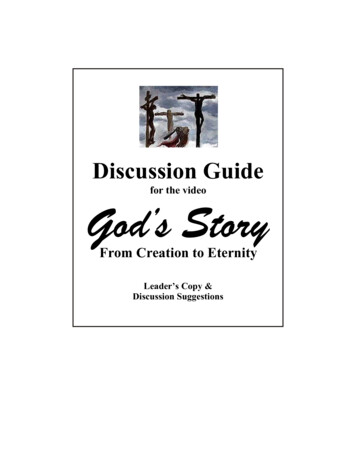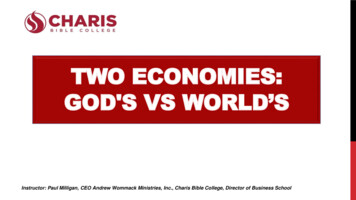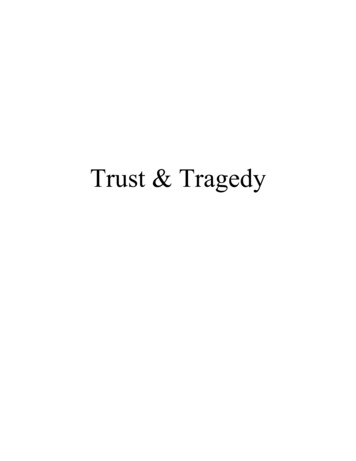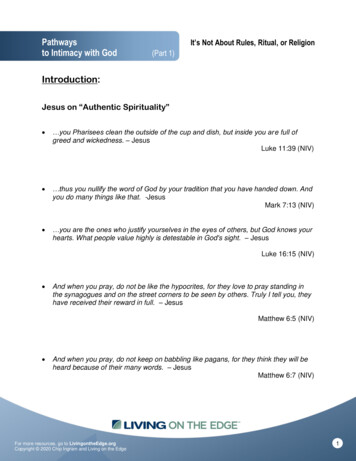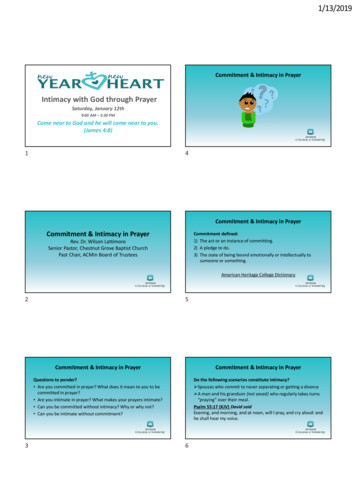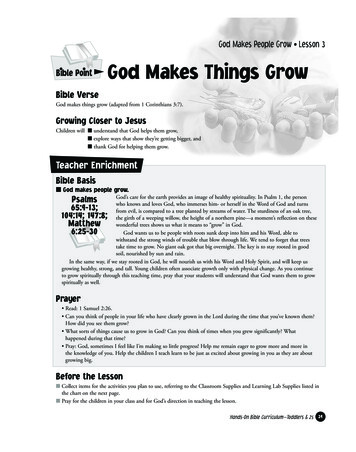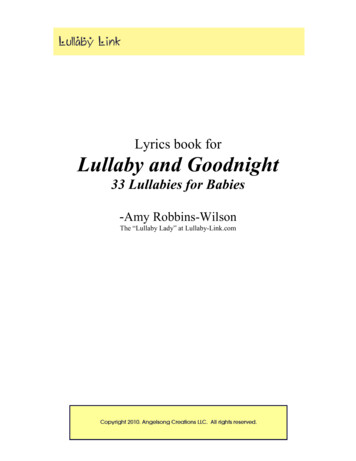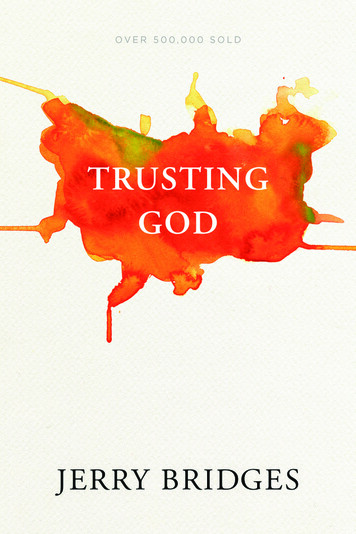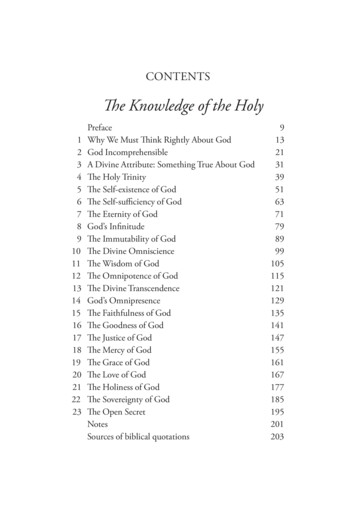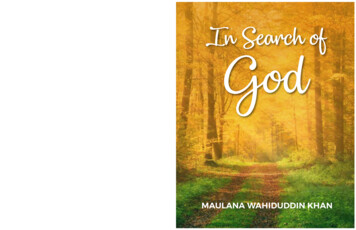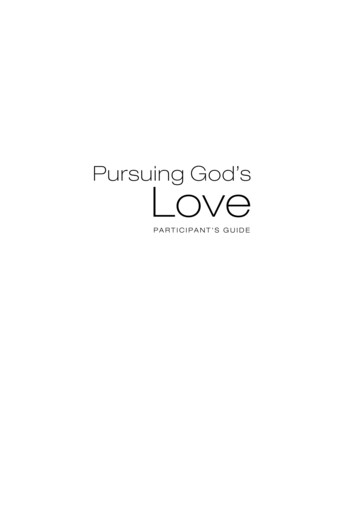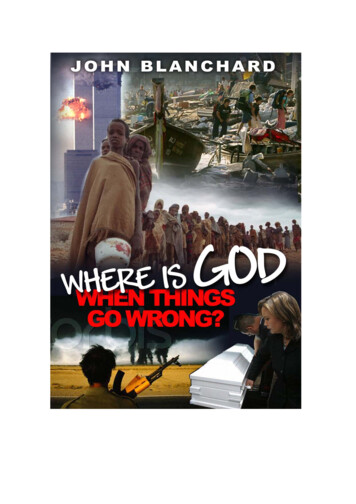
Transcription
EVANGELICAL PRESS
EVANGELICAL PRESSFaverdale North Industrial Estate, Darlington, DL3 0PH, EnglandEvangelical Press USAP. O. Box 825, Webster, New York 14580, USAe-mail: sales@evangelicalpress.orgweb: http://www.evangelicalpress.org Evangelical Press 2005. All rights reserved. No part of this publication maybe reproduced, stored in a retrieval system or transmitted, in any form, or byany means, electronic, mechanical, photocopying, recording or otherwise,without the prior permission of the publishers.First published 2005British Library Cataloguing in Publication Data availableISBN 0 85234 590 9Scripture quotations in this publication are from the Holy Bible, New International Version. Copyright 1973, 1978, 1984, International Bible Society.Used by permission of Hodder & Stoughton, a member of the Hodder HeadlineGroup. All rights reserved.
Life could hardly have been better forthe beautiful American teenager as sheprepared to dive into the sparkling watersof Chesapeake Bay Her father had come through the nation’s Great Depression by skilfully building things ‘from stuff others threw away’, eventually becoming a successfulbusinessman and on the United States wrestling team at the 1932 OlympicGames held in Los Angeles.With her three sisters she had assimilated their father’s secure core values,while delightful family holidays, sports (she was captain of the girls’ lacrosseteam at her school) and a place in the school’s Honour Society were seamlessparts of her serene teenage years. In her own words, ‘As far back as I couldremember, there had been nothing but happiness surrounding our lives andhome.’ To cap it all, God also seemed to be on board. Churchgoing was almostas natural to her as breathing and in her mid-teens she had professed herselfa committed Christian.3
She must have felt on top of the world. Now, as the sun was setting at theend of that hot July day, she anticipated the thrill of knifing through the cool,refreshing water. She flexed her suntanned arms and legs and dived in. Fiveseconds later her life had changed for ever As she turned back towards the surface, her head struck a rock, trappingher on the sandy floor of the bay. Sprawling out of control, she felt ‘somethinglike an electric shock, combined with a vibration — like a heavy metal springbeing suddenly and sharply uncoiled’. She desperately tried to fight her wayto the surface, but her arms and legs failed to respond to the frantic messagesfrom her brain. When she could hardly hold her breath any longer, a tidal swelllifted her part of the way up. Her sister Kathy reached down to grasp her andwith the help of others manoeuvred her onto dry land.An ambulance rushed her to hospital and as the siren wailed she tried tofight her fear with long-remembered verses from the Bible: ‘The Lord is myShepherd, I shall not be in want. He makes me lie down in green pastures ’In the emergency room, confused, frightened and feeling queasy from theusual hospital smells, she again reached out to Scripture: ‘Even though I walkthrough the valley of the shadow of death, I will fear no evil, for you are withme ’After a series of tests and X-rays, doctors performed emergency surgery onher head. The next days were spent drifting in and out of consciousness whilestrapped into a Stryker Frame, a canvas ‘sandwich’ which allowed her to beturned over every two hours without individual parts of her body being moved.Her conscious hours were punctuated by fear and pain and her unconsciousones by terrifying dreams and drug-induced hallucinations.A bone scan and a myelogram followed, then delicate surgery to offset thedamage caused by a fracture-dislocation of the spine, but eventually the doctorsfaced her with the facts: she was a total quadriplegic. In layman’s language,injury to her spinal cord meant that she would never again be able to use herarms, hands or legs.She was utterly devastated. The weeks that followed included fleeting moments of hope as the doctors suggested various forms of treatment and therapy,but they were soon shut out by bitter resentment:4
‘Oh, God, how can you do this to me?’‘What have you done to me?’‘What’s the use of believing when your prayers fall on deaf ears?’‘God doesn’t care. He doesn’t even care.’Grief, remorse and depression swept over her ‘like a thick, choking blanket the mental and spiritual anguish was as unbearable as the physicaltorture How I wished for strength and control enough in my fingers to dosomething, anything, to end my life!’ Earlier years of spiritual security nowseemed a mocking background to one inescapable question: ‘Where is Godwhen things go wrong?’The question goes back thousands of years and the argument behind it canbe summarized like this:1. Evil and suffering exist in the world.2. If God were all-powerful, he could prevent evil and suffering.3. If he were all-loving, he would want to prevent these.4. If there were an all-powerful, all-loving God, there would beno evil and suffering in the world.5. God is therefore powerless, loveless or non-existent.God in the dockThe logic seems pretty watertight and the case against God even stronger whenwe read what the Bible says about him. It claims not only that he is ‘God ofgods and Lord of lords mighty and awesome’ (Deuteronomy 10:17) and‘works out everything in conformity with the purpose of his will’ (Ephesians1:11), but that he is ‘compassionate and gracious, slow to anger, aboundingin love’ (Psalm 103:8). At first glance it seems impossible to reconcile thesestatements with what is happening every day in the world around us and, aswe know that catastrophes, accidents, disease, evil, pain, suffering and deathare facts (someone has said, ‘The history of the human race is nothing less5
The history of thehuman race is nothingless than the history ofsuffering.6than the history of suffering’), many think itlogical to conclude that God is non-existent. Thecontemporary apologist Ravi Zacharias says, ‘Ihave never defended the existence of God at auniversity without being asked about this question of evil in the world.’For some people, the question arises in amoment of terrible trauma. During the ruthless‘ethnic cleansing’ of Kosovo in the late 1990s,one woman told the news media of soldiersseparating ten women from their families andraping them by the roadside. As they did so,they sneered, ‘We are not going to shoot you,but we want your families to see what we aredoing.’ Telling her story to reporters, she added,‘It was then that I came to know that God doesnot exist.’ This was not a formal declaration ofphilosophical atheism, but a passionate cry fromthe heart, one that many others have shared inmoments of searing pain. Hard-core atheists turnthe question into a creed: ‘There is no God; andevil and suffering prove it.’In contemporary usage ‘evil’ is a broad termdescribing anything that is seen as bad or harmful. This covers two main categories: on
the one hand, naturally occurring events which cause harm and suffering, andon the other, morally reprehensible human behaviour. We could cite countlessexamples of both.Natural disastersSuffering which is attributable to natural causes is most easily thought of interms of natural disasters, and a few outstanding examples speak for thousandsof others. In 1319 the fallout from the Mount Etna volcano killed 15,000 inthe town of Catania. In 1755 the terrifying Lisbon earthquake virtually wiped out theentire city. The effects were so widespread that the waters in Scotland’sLoch Lomond rose and fell several feet every ten minutes for an hourand a half. In 1923 some 160,000 people perished in Japan when earthquakesstruck Tokyo and Yokohama.How do these events square with the Bible’s claim that ‘In [God’s] hand are thedepths of the earth, and the mountain peaks belong to him’? (Psalm 95:4). In 1953 a record spring tide wreaked havoc on both sides of the NorthSea, killing nearly 2,000 people in Holland and over 300 in England. When Hurricane Mitch, dubbed ‘the storm of the century’, hit SouthAmerica in 1998, 12,000 people were drowned or crushed to death andmillions left homeless following torrential rain and winds of up to 150miles per hour. In the last major natural disaster of the twentieth century some 30,000people perished when freak rains hit Venezuela in December 1999. Just five years later, the whole world was shaken by an even greatercatastrophe 7
Tsunami!At 7.58 a.m. local time on 26 December 2004, tectonic plates several milesunder the sea off the north-western tip of the Indonesian archipelago sprangapart with the force of more than 1,000 atomic bombs, triggering thirty-sixearthquakes, displacing trillions of tons of water and realigning a 600-milesection of the Indian Ocean’s seabed. The biggest earthquake registered 9.0on the Richter scale and the massive upheaval of water generated a tsunami,a long, high sea wave that began to race across the ocean at over 500 milesper hour.Twenty minutes later five colossal waves laid waste the market townof Banda Aceh in Sumatra. Thousands perished; less than 100 survived.Elsewhere in Indonesia, the busy town of Lhuknga was scoured off the faceof the earth by a black wall of water twice as high as its palm trees. Only afew dozen of Lhuknga’s 10,000 inhabitants escaped the deluge. The officialIndonesian death toll eventually reached well over 220,000. As it roared acrossthe Indian Ocean, the tsunami overwhelmed the Andaman and Nicobar islands,sweeping 7,000 people to death.In eighty minutes it had reached the coast of Thailand, where luxury resortslike Phuket, Koh Lanta, Koh Phi Phi and Krabi lay directly in its path. Theresult was almost beyond description. Moments earlier holidaymakers hadbeen strolling along the beaches while babies slept in their cots and patientsin hospital beds. Businessmen, housewives and others were going about theirday’s work. Suddenly, with no more than a few moments’ warning, a successionof stupendous waves changed their world for ever. One survivor said, ‘It wasas if someone had pulled out the plug of the ocean.’ Hotels, guest houses,homes and offices collapsed like packs of cards. Motor vehicles were tossedinto nearby trees as if they were matchbox models. Over 5,000 people died.In another twenty minutes the tsunami hit Sri Lanka, devastating the seasidetown of Galle and the nearby coastline. Within minutes thousands of corpseslittered the streets and beaches. Survivors clung desperately to trees and buildings while a raging torrent of water swept past them, carrying a ghastly cargoof debris and drowned animals, along with countless human bodies, some of8
them gashed open or dismembered by the force of the water. The eight coachesof a crowded train were hurled from the tracks and flung into nearby trees likeunwanted toys; there were 1,000 passengers; only a handful survived. Of wellover 46,000 deaths in Sri Lanka, at least 15,000 were children.Two hours after the initial earthquake, the wall of water had crossed the Bayof Bengal and ripped into the islands and towns of India’s east coast, claiming over 10,000 lives, including an entire church congregation gathered formorning worship. Seven hours after the earthquake, gigantic waves swampedMale, the capital of the Maldives, most of whose 1,190 islands are only a fewfeet above sea level. Fourteen islands were flattened and nearly 100 peopledrowned. An hour later and the waves hit the east coast of Africa, killing over200 people in Somalia, Kenya and Tanzania.Four weeks on, the tsunami’s official death toll was put at over 280,000,but the true figure may never be known. A United Nations spokesman saidthat, in terms of the area affected, this was the greatest natural catastrophein the world’s history. The Independent rightly called it ‘the wave that shookthe world’ — some of Asia’s islands shifted their positions by several metres,both laterally and vertically; in Great Britain, over 7,500 miles away from theepicentre, the earth moved to a measurable extent; and geologists right aroundthe world registered vibrations.It shook the world in other ways, too. A Daily Telegraph editorial admitted, ‘Our brains are not designed to compute suffering on such a scale theswallowing up of whole communities is literally unimaginable.’ United StatesPresident George W. Bush said that the event ‘brought loss and grief to theworld beyond our comprehension’.But how can this appalling disaster, and the others mentioned earlier, bereconciled with the Bible’s assurance that ‘The LORD does whatever pleaseshim, in the heavens and on the earth, in the seas and all their depths’, and itsinsistence that ‘ ocean depths do his bidding’? (Psalms 135:6; 148:7). ADaily Telegraph reader answered for many: ‘Those with religious beliefs aresurely right to consider that a national disaster is a test of their faith. On theabundant available evidence does it not seem that, if there is or was a God, itis now malevolent, mad or dead?’9
Disaster by design?Many other charges are levelled against God. Our planet can supply all ourfundamental needs, yet teems with living organisms, from poisonous vegetationto viruses, and from killer sharks to bacteria, that can disfigure, dismemberor destroy us. Even the air we breathe is sometimes contaminated withlife-threatening agents of one kind or another.Is this what we should expect of a God who ‘[gives] life to everything’(Nehemiah 9:6) and whose verdict on the whole of creation was that it was‘very good’? (Genesis 1:31). In a debate at the University of California atIrvine, Gordon Stein, then Vice-President of Atheists United, twisted the knife:‘If all living things on the earth were created by a God, and he was a lovingGod who made man in his own image, how do you explain the fact that hemust have created the tapeworm, the malaria parasite, the tetanus germ, polio,ticks, mosquitoes, cockroaches and fleas?’AccidentsThe world-class scientist and theologian Sir John Polkinghorne has rightly saidthat we live in ‘a world with ragged edges, where order and disorder interlacewith each other’, an assessment borne out in part by billions of accidents. Mostare relatively trivial, but the outcome of some is so appalling that one word isenough to identify them years after the event concerned. When the British passenger liner Titanic was launched it was thelargest and most luxurious ever built. Its owners boasted that ‘Godhimself couldn’t sink this ship’, yet on her maiden voyage in 1912 shestruck an iceberg in the North Atlantic and, in the greatest maritimedisaster in history, sank with the loss of over 1,500 lives. On the night of 2 December 1984 the slums of the Indian city ofBhopal were enveloped in toxic gas released by accident from a pesticide factory. Over twenty tons of methyl iso-cyanate leaked into theatmosphere, its poisonous cloud burning the tissues of people’s eyes10
and lungs and attacking their central nervous systems. Many lost controlof their bodily functions and drowned in their own body fluids. Nearly4,000 people died within a few hours. Unclaimed bodies were drivenby the truckload to burial- and burning-grounds. Another 16,000 ofthose poisoned that night died within the following twenty years, at theend of which time another 150,000 were still receiving regular medicaltreatment. On 26 April 1986 two explosions destroyed the core of Unit 4 inthe RBMK nuclear reactor in the Ukrainian town of Chernobyl. Theworld’s worst nuclear-power accident released radiation equivalent toa thousand times that of the atomic bombs that destroyed Hiroshimaduring the Second World War. Only thirty-one people were killed at thetime, but ten million others living in twenty-seven cities and over 2,600villages had to be evacuated from contaminated areas. Later estimatessuggested that up to 800,000 Ukrainian children might be at a long-termrisk of contracting leukaemia, while one report said it might take 200years to remove the effects of the catastrophe.These appalling accidents represent countless others: aeroplanes crash;trains are derailed; road vehicles collide; ships are lost at sea; buildings collapse; bridges give way; trees fall; machinery malfunctions. In hundreds ofdifferent ways, every day adds to the millions accidentally killed, maimed orinjured.How can all of this be part of the Bible’s scenario in which a caring, controlling God ‘works out everything in conformity with the purpose of his will’?(Ephesians 1:11).Man on manWhen we think of ‘evil’ in a moral sense we usually have in mind ‘man’sinhumanity to man’ — and history teems with it.11
It has been estimated that in the last 4,000 years there have been lessthan 300 without a major war. Someone wryly called peace ‘merely atime when everybody stops to reload’. Thirty million people were killedin the First World War alone. The figures for the Second World War are so vast that they havenever been accurately computed, but they include six million Jews exterminated by the German dictator Adolf Hitler (he called them ‘humanbacteria’) in the infamous Holocaust, part of his plan to build an Aryan‘super-race’. Men, women and children were gassed twenty-four hoursa day in Nazi extermination camps, their remains scavenged for hair,skin and gold teeth to make cushions, lampshades and jewellery. Even the sickening bloodletting of two world wars did not meanthe end of massive atrocities. Opponents of the Chinese dictator MaoTse-tung’s Cultural Revolution in China in the 1950s were executed atthe rate of over 22,000 a month. In the 1970s, the Cambodian MarxistPol Pot slaughtered over 1,500,000 of his fellow countrymen in lessthan two years. A savage civil war in Rwanda in 1994 claimed 800,000victims, decimating the country and leaving nearly 350,000 orphanedchildren behind. ‘9/11’ has become shorthand for the audacious terrorist attack onthe United States on 11 September 2001. In a meticulously coordinatedassault, two commercial aircraft on scheduled flights were hijacked andrammed into the twin towers of New York’s World Trade Centre. Officeequipment, human bodies and body parts were blown or sucked out ofthe buildings and rained down on to the surrounding streets ‘like tickertape’. Within ninety minutes the towers collapsed, setting off a hugemushroom cloud of yellow dust so massive and dense that it blotted outthe sun. When the dust eventually settled, nearly 3,000 men, womenand children lay buried under a hideous mass of rubble.A third hijacked airliner had been steered into the Pentagon in Washington, D.C., killing nearly 200 people, while a fourth, in which passengers had bravely thwarted the terrorists’ intentions, crashed into a fieldin Pennsylvania, with the loss of forty-five lives. It was the bloodiest day12
in the nation’s history since its Civil War, which ended in 1865, and themost devastating attack the world had ever known. Small wonder that aneditorial in The Times called 11 September 2001 ‘the day that changedthe modern world’, or that the Daily Mail’s Mark Almond wrote, ‘History will never be the same again.’ Before 1 September 2004 relatively few people had ever heard ofBeslan, a small town in the South Russian republic of North OssetiaAlania, yet a few days later there were no fewer than 10,000 ‘Beslan’sites on one internet search engine alone. The town was catapulted fromobscurity to infamy when a squad of some thirty highly organized terrorists with links to Chechen separatists seized Middle School No.1, tookmore than a thousand hostages, mostly children,then planted explosive devices throughout theschool. When Russian special forces stormedthe building, the terrorists’ response was toWhere is God?Where is he?Where can he be now?13
massacre 350 of their captives, most of them children. Over 700 childrenand school staff were hospitalized and the whole nation was plungedinto mourning. Western observers called it ‘Russia’s 9/11’.How do these atrocities — and countless lesser ones — make any sense inthe light of the Bible’s teaching that God is ‘a refuge for the poor, a refuge forthe needy in his distress, a shelter from the storm and a shade from the heat’,and a caring Sovereign who ‘guards the course of the just’? (Isaiah 25:4; Proverbs 2:8). Many people make no attempt to do so. During the Second WorldWar the British novelist H. G. Wells wrote, ‘If I felt there was an omnipotentGod who looked down on battles and deaths and all the waste and horror of thiswar — able to prevent these things — doing them to amuse himself, I wouldspit in his empty face.’ The Jewish author Elie Wiesel survived the Holocaustand in his deeply moving book Night he told of some of its horrors — babiespitchforked as if they were bales of straw, children watching other childrenbeing hanged, and his mother and other members of his family thrown into afurnace fuelled by human bodies, while prisoners groaned, ‘Where is God?Where is he? Where can he be now?’ When it was all over Wiesel said that hisexperience ‘murdered my God and my soul and turned my dreams to dust’. Ina wider context the British art critic Brian Sewell confessed: ‘After watchinga world gone mad with greed and aggression I ceased to believe in Godand abandoned faith and its observance.’QuestionsFor many people the case against God seems pretty watertight — but is it?Before building a biblical reply some critical questions need to be asked.Why should issues of good and evil, or human suffering, cause any problems? If the British philosopher Bertrand Russell was right to dismiss man as‘a curious accident in a backwater’, why should it matter in the least whetherlives are ended slowly or suddenly, peacefully or painfully, one by one or enmasse? If the Oxford professor Peter Atkins, another dogmatic atheist, is rightto call mankind ‘just a bit of slime on a planet’, why should we be remotely14
concerned at the systematic slaughter of six million Jews or half a millionRwandans? Are we traumatized when we see slime trodden on or shovelleddown a drain? The whole world wept over the destruction and death broughtabout by the tsunami in the Indian Ocean, but why not have the same anguishover the fate of beetles or bacteria, rats or reptiles? If human beings are simplythe result of countless chemical and biological accidents, how can they haveany personal value, and why should we turn a hair if dictatorial regimes ornatural disasters dispose of them by the million? The same applies to violenceor bloodshed on a personal or limited basis. If we are nothing more thanbiological flukes, with no meaningful origin or destiny, why should the waywe treat each other matter more than the way other creatures behave?How can evolutionary development be a basis for morality and moralstandards? The British scientist-turned-preacher Rodney Holder pinpoints theproblem: ‘If we are nothing but atoms and molecules organized in a particularway through the chance processes of evolution, then love, beauty, good andevil, free will, reason itself — indeed all that makes us human and raises usabove the rest of the created order — lose their objectivity. Why should I lovemy neighbour, or go out of my way to help him? Rather, why should I not geteverything I can for myself, trampling on whoever gets in my way?’How can we jump from atoms to ethics and from molecules to morality?If we are merely genetically programmed machines, how can we condemnanything as being ‘evil’, or commend anything as being ‘good’? Why shouldwe be concerned over issues of justice or fairness, or feel any obligation totreat other ‘machines’ with dignity or respect? When people respond to tragedyby asking, ‘How can there be a just God?’ their question is logically flawed,as without him words like ‘just’ and ‘unjust’ are purely matters of personalopinion.Far from moral problems ruling out the existence of God, our sense ofthings being right or wrong, fair or unfair, just or unjust is a strong clue thatthere is some transcendent standard that affects us all.Where else, apart from God, can we find a basis for conscience, the mysterious moral monitor that wields such remarkable and universal power?Conscience is not to be confused with instinct or desire, as it often cuts acrossboth, but where does it get its traction? We have already seen that nature is15
neutral and has no moral values. Personal choice is also a non-starter, as itcould justify any course of action, from the foulest to the finest. Society is nomore reliable, as it is merely an amalgamation of individuals. On the otherhand, our creation by an all-righteous God would provide a rational and logicalbasis for conscience and explain our sense of personal obligation. The distinguished geneticist Francis Collins, who led the successful effort to completethe Human Genome Project, makes the point well: ‘This moral law, whichdefies scientific explanation, is exactly what one might expect to find if onewere searching for the existence of a personal God who sought relationshipwith mankind.’Asking and answering these questions points us to what some will find thestrangest of conclusions: the existence of evil points towards the existenceof God, not away from it! Getting rid of God does not solve the problem ofevil and suffering; it merely leaves us trapped in what someone has called‘that hopeless encounter between human questioning and the silence of theuniverse’.Here are children born with a congenital disease as a result of their parents’promiscuous lifestyle, a pensioner lying in a pool of blood after being savagedby a passing hooligan, a young mother who suddenly discovers that she hasbreast cancer, a successful businessman who notices the first signs of Parkinson’s disease, distraught parents discovering their child is autistic, a pedestrianparalysed for life after being mown down by a drunken driver, a haemophiliacwho has contracted AIDS by being infected with HIV during a blood transfusion, a frantic mother watching as New York’s twin towers crumple, carrying her son to his death, a holidaymaker in Sri Lanka watching helplessly ashis wife and children are swept away by a ferocious wall of water. Talk of asovereign, loving God may not provide instant or totally satisfying answersto such people, but atheism is incapable of either explanation or consolation.Can thinking, feeling, hurting, grieving, questioning people live with this? Isit sufficient to tell the sufferers that tragedies and catastrophes are sick jokesand that truth, values and hope are figments of human imagination? Must wecondemn hurting humanity to the total darkness that remains when God isdiscarded?16
Awkward factsThese are not the only questions that need to be raised. Others arise when wenail down some basic facts. Although our planet provides enough food to feed all six billion ofus, millions die of starvation every year because of our selfish pollutionof the atmosphere, our exploitation or mismanagement of the earth’sresources and the vicious policies of dictatorial regimes. Can we blameGod for these? Is he responsible for diverting disaster funds into thepockets of tyrannical rulers or greedy politicians? Millions are dyingof hunger in India while its national religion forbids the use of cowsas food. Hinduism has millions of man-made gods; can the country’schronic food problems be blamed on the one it ignores? Suffering is often caused by human error or incompetence. Had theowners of the Titanic not reduced the recommended number of lifeboatsto avoid the boat deck looking cluttered, many more, if not all, of theship’s passengers might have been saved. Was God responsible for thatexecutive decision? The International Atomic Enquiry Agency blamed‘defective safety culture’ for the Chernobyl disaster. Can the blame forcareless neglect of safety procedures be laid at God’s door? A great deal of human suffering is deliberately self-inflicted. Smokers who ignore health warnings and are crippled by lung cancer or heartdisease, heavy drinkers who suffer from cirrhosis of the liver, drugaddicts and those dying of AIDS after indiscriminate sex are obviousexamples. So are gluttons who dig their graves with knives and forks,workaholics who drive themselves to physical or mental breakdowns, tosay nothing of the countless people who suffer from serious illness as adirect result of suppressed hatred, anger, bitterness and envy. Is God toblame for their behaviour? Can we point the finger at God when an aircrash is caused by pilot error? Is he at fault when a drunken motoristcauses an accident, a train is driven through a danger signal, or a ship’scaptain ignores safety procedures? Is God guilty when a person steps17
carelessly in front of a bus? Is he responsible when a reckless tackleby a footballer ends an opponent’s career?The link between wrongdoing and its consequences is so clear that Iwant to make the point in a directly personal way. Ravi Zacharias tells of adiscussion he and others had with an American business tycoon, who askedwhy God was silent when there was so much evil in the world. At one pointsomeone asked the businessman, ‘Since evil seems to trouble you so much, Iwould be curious to know what you have done about the evil you see withinyou.’ There was what Zacharias called ‘a red-faced silence’. How would youhave responded? Are you doing everything you can to root out from your lifewhatever you sense to be less than perfect and to ensure that you do nothingwhatever to add to the pain, suffering, misery and unhappiness in the world?If not, are you qualified to accuse God of mismanagement?The Bible says The Bible says a great deal on the subject, but at no point does it offer glib orsimplistic answers to solve all problems, end all pain and tie up all the looseends. Instead, it says that with regard to the deepest matters of all, ‘we seebut a poor reflection’ (1 Corinthians 13:12) in this life. Sceptics may see thisas dodging the issue, but this arg
contemporary apologist Ravi Zacharias says, 'I have never defended the existence of God at a university without being asked about this ques-tion of evil in the world.' For some people, the question arises in a moment of terrible trauma. During the ruthless 'ethnic cleansing' of Kosovo in the late 1990s,
